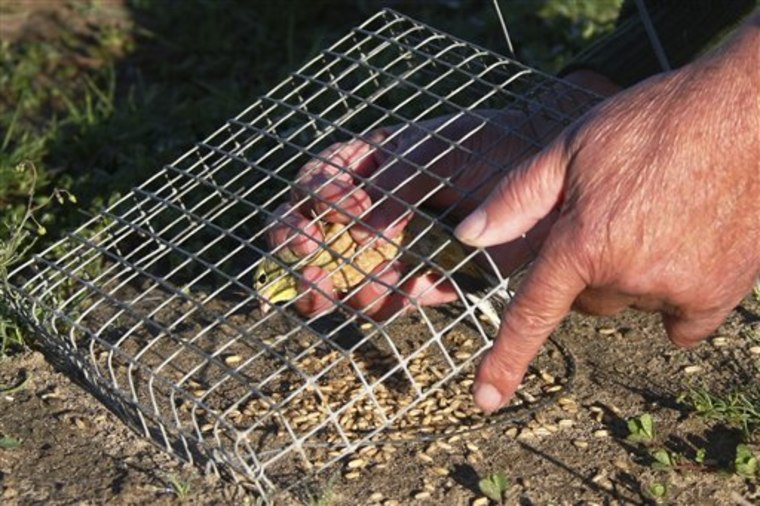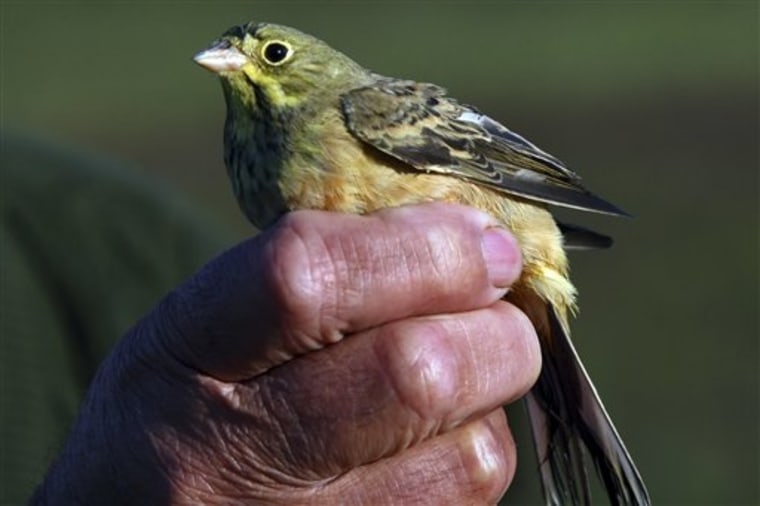Scottish haggis. Mexican chili-dusted grasshoppers. On the world's list of weird foods, ortolan — a bite-size songbird roasted and gulped down whole — can claim a place of distinction.
It's an endangered place, though, since the ortolan is an endangered species in France. And the French government is out to get poachers hunting the coveted fowl.
Thought to represent the soul of France, ortolan was on the menu at late French President Francois Mitterrand's legendary "last supper" on New Year's Eve, 1995. Though cancer had diminished his appetite, Mitterrand saved room for the piece de resistance, the roasted ortolan, downing the two-ounce bird, bones and all. He died eight days later.
According to tradition, the French shroud their head in a napkin to eat ortolan: Tucking into the bite-sized bird — which is killed by being drowned in armagnac, plucked and roasted with its yellow skin and skeleton intact — can be a messy business.
It's also an illicit one.
A 1998 law banned hunting in France of the ortolan, a copper-breasted bird that migrates from Africa to Europe, because of its endangered status. Ortolan hunters — who trap the birds alive and keep them in cages for several weeks to fatten them up — face fines of up to $12,500 and six months in prison, if caught and convicted.
While the species' global population is not considered threatened — with estimates ranging from 10 million to 32 million — the ortolan in France is considered a vulnerable species given the extent of hunting.
30 live birds, and 12 frozen, at one house
Earlier this month, the junior minister in charge of the environment, Nathalie Kosciusko-Morizet, pledged to step up inspections of the ortolan's habitat in the Landes region in southwestern France.
The increased inspections have already born fruit, she said.
"The more you inspect, the more violations you find," Kosciusko-Morizet told The Associated Press. Four hunters were caught red-handed and two seizures were made over the past two weeks, she said.

At one hunter's house, inspectors found about 30 live birds being fattened in cages and another dozen frozen ones in the freezer, Kosciusko-Morizet said. The man had set over 100 traps in a nearby forest, she said.
Environmentalists blame the poaching on continued demand for roasted ortolan — which aficionados say is satisfyingly crunchy, with a subtle hazelnutty taste.
No longer on restaurant menus in France because of the ban, ortolan is eaten at home or served secretly to special restaurant clients. A single bird can fetch between $140-$210 on the black market, said Allain Beaugrain Dubourg, head of the League for the Protection of Birds.
He said hunters kill as many as 30,000 ortolans each year in France alone, contributing to an estimated 30 percent decline in their numbers over the past decade.
Goal is to sustain hunting
Fans of the dish have decried the increased inspections, saying they threaten a uniquely French culinary tradition, Beaugrain said.
Chefs contacted by The Associated Press declined to comment.
Kosciusko-Morizet insists the stepped-up enforcement of the hunting ban is not aimed at ending the tradition, but rather at making it viable again.
"When we are talking about hunting a protected species, there comes a moment when you have to stop hunting it — if only to guarantee the species' continuity," she said, adding that the government lifted other hunting bans once the animals' numbers stabilized.
In the meantime, Kosciusko-Morizet is hoping people will lay off ortolans and turn their attention to other, legal French delicacies instead.
Escargot, anyone?
